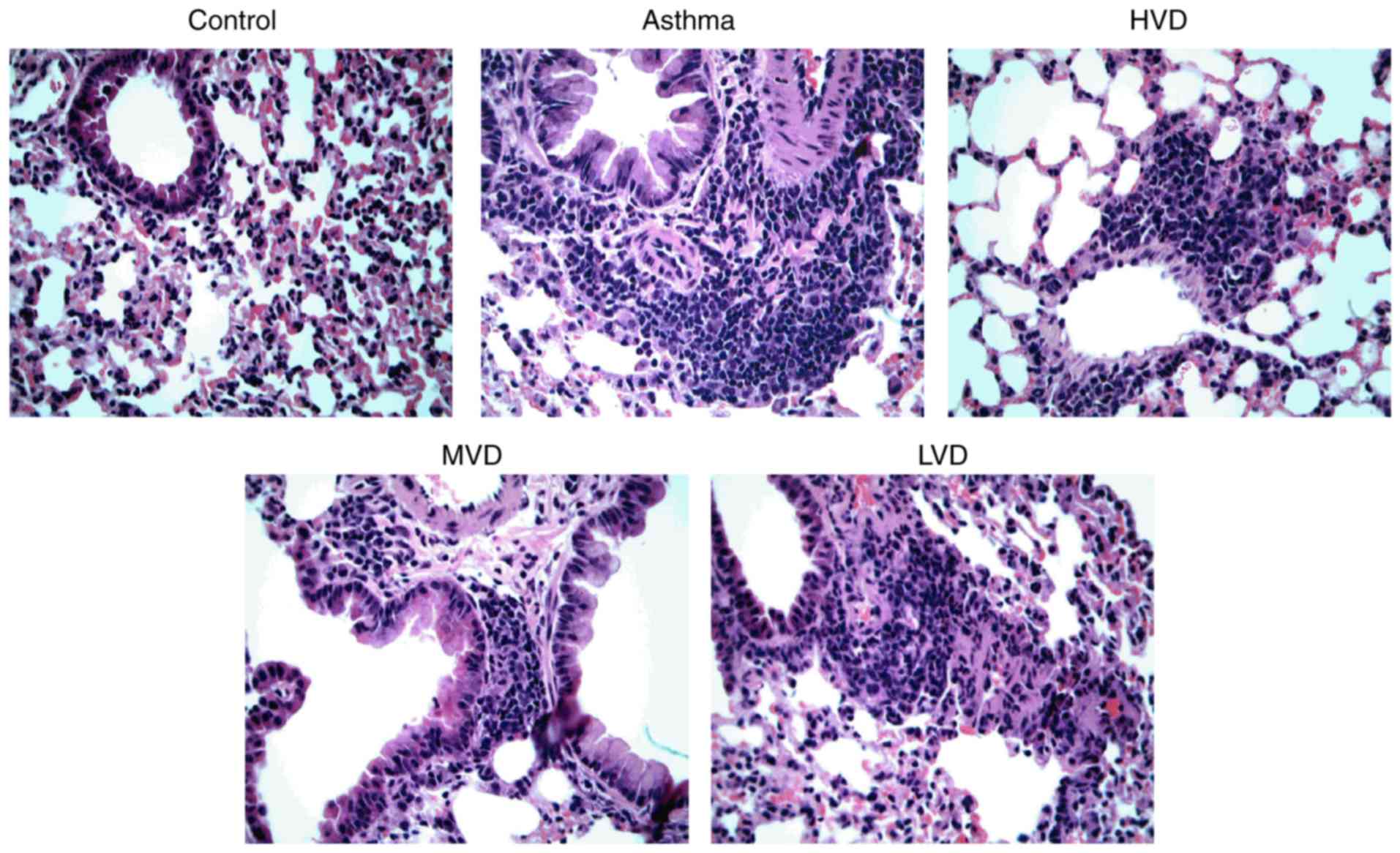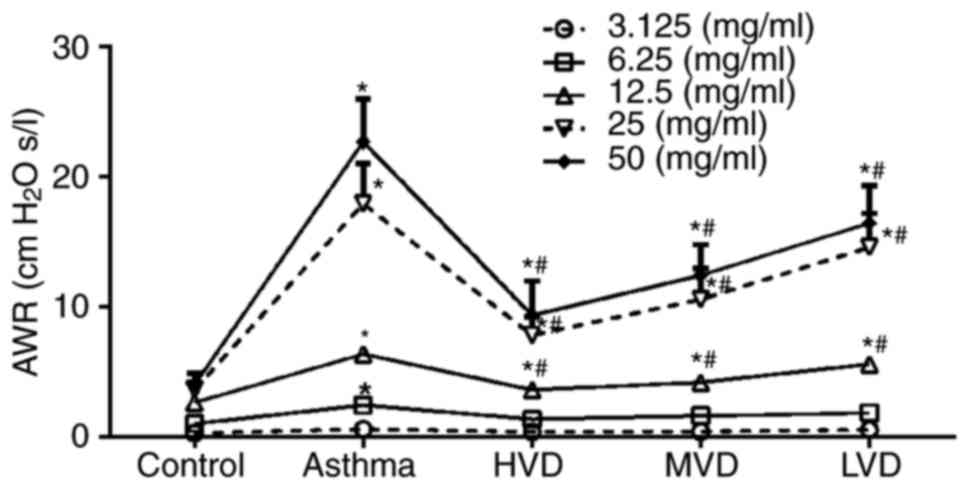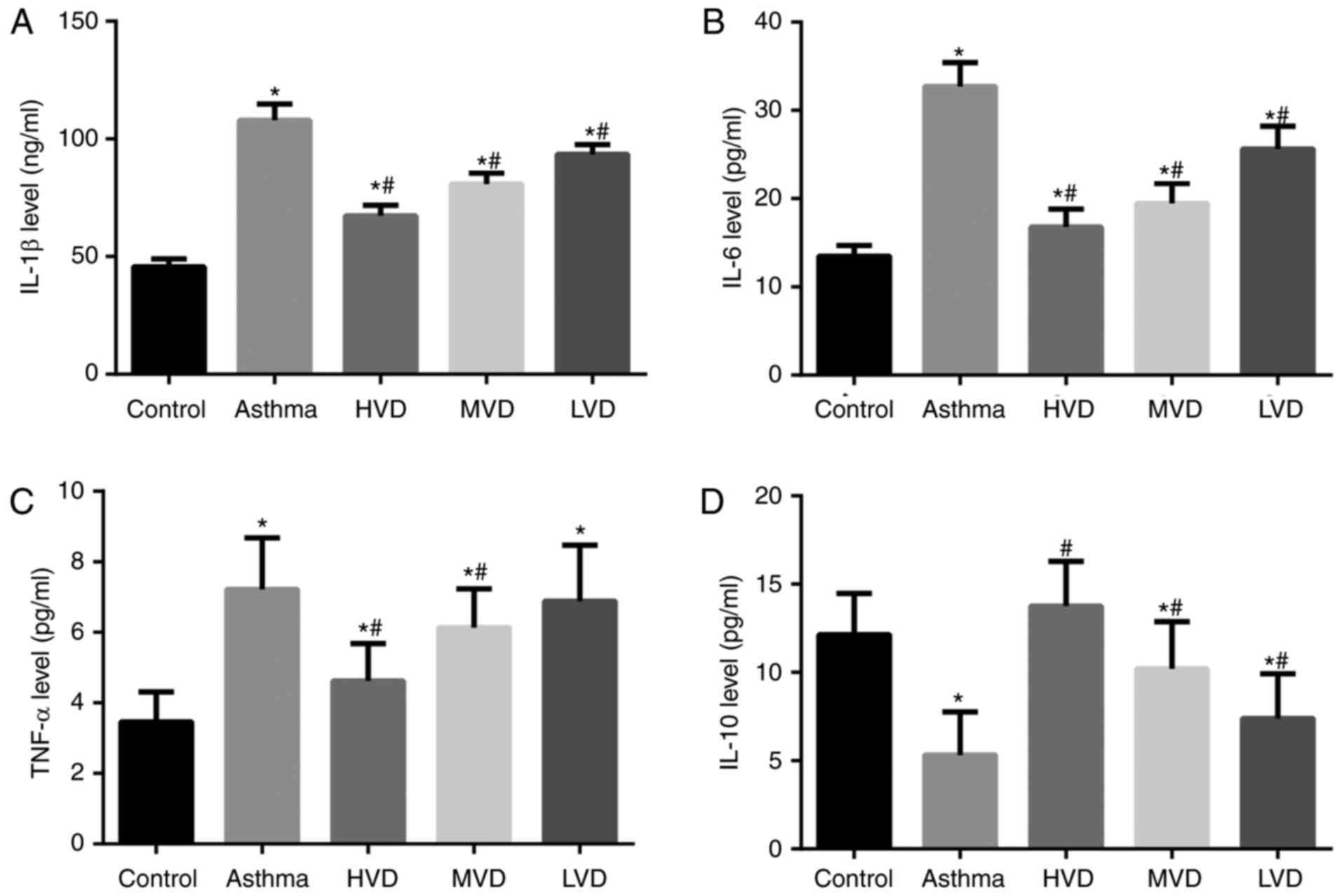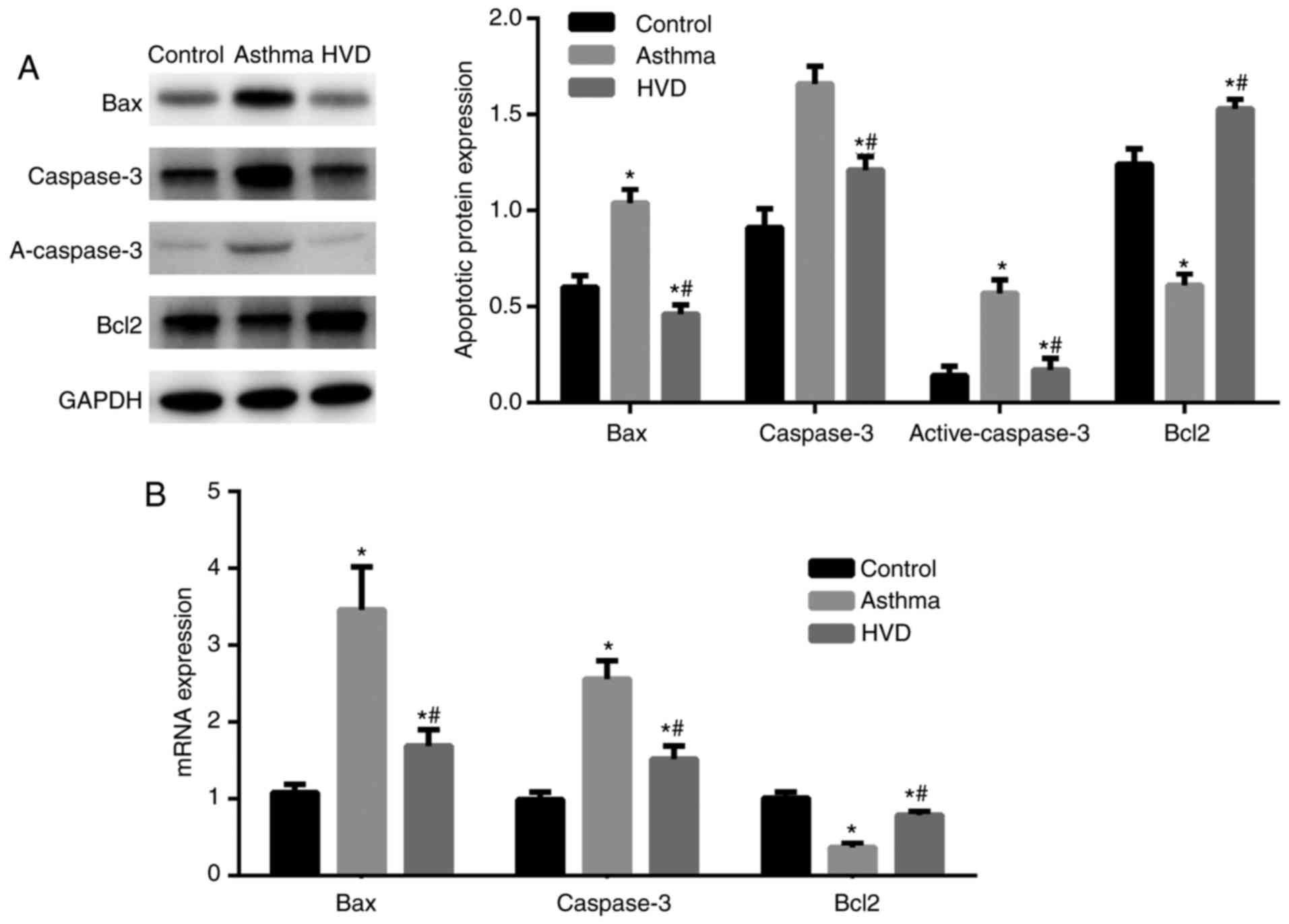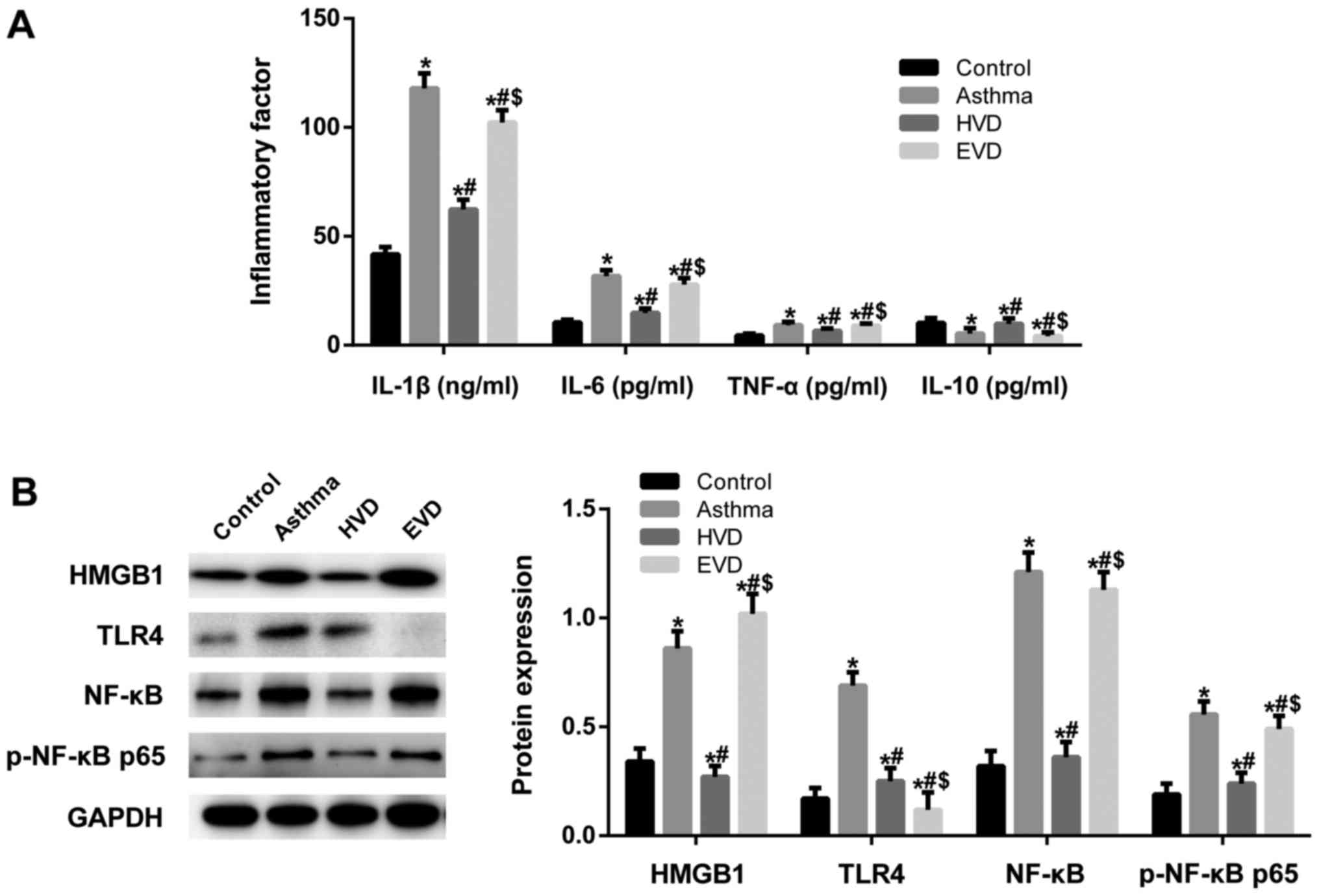|
1
|
Vora AC: Bronchial asthma. J Assoc
Physicians India. 62 3 Suppl:S5–S6. 2014.
|
|
2
|
Yu HY, Li XY, Cai ZF, Li L, Shi XZ, Song
HX and Liu XJ: Eosinophil cationic protein mRNA expression in
children with bronchial asthma. Genet Mol Res. 14:14279–14285.
2015. View Article : Google Scholar : PubMed/NCBI
|
|
3
|
Ciepiela O, Ostafin M and Demkow U:
Neutrophils in asthma-a review. Respir Physiol Neurobiol.
209:13–16. 2015. View Article : Google Scholar : PubMed/NCBI
|
|
4
|
Erokhina IL, Voronchikhin PA, Okovityĭ SV
and Emel'ianova OI: Reaction of population of pulmonary mast cells
in rat bronchial asthma under the effect of β-adrenoreceptor
antagonists. Tsitologiia. 55:472–474. 2013.(In Russian). PubMed/NCBI
|
|
5
|
Yang H, Antoine DJ, Andersson U and Tracey
KJ: The many faces of HMGB1: Molecular structure-functional
activity in inflammation, apoptosis, and chemotaxis. J Leukoc Biol.
93:865–873. 2013. View Article : Google Scholar : PubMed/NCBI
|
|
6
|
Smolarczyk R, Cichoń T, Jarosz M and Szala
S: HMGB1-its role in tumor progression and anticancer therapy.
Postepy Hig Med Dosw (Online). 66:913–920. 2012.(In Polish).
View Article : Google Scholar : PubMed/NCBI
|
|
7
|
Kamo N, Ke B, Ghaffari AA, Shen XD,
Busuttil RW, Cheng G and Kupiec-Weglinski JW: ASC/caspase-1/IL-1β
signaling triggers inflammatory responses by promoting HMGB1
induction in liver ischemia/reperfusion injury. Hepatology.
58:351–362. 2013. View Article : Google Scholar : PubMed/NCBI
|
|
8
|
Wang T, Wei XY, Liu B, Wang LJ and Jiang
LH: Effects of propofol on lipopolysaccharide-induced expression
and release of HMGB1 in macrophages. Braz J Med Biol Res.
48:286–291. 2015. View Article : Google Scholar : PubMed/NCBI
|
|
9
|
Willenbrock S, Braun O, Baumgart J, Lange
S, Junghanss C, Heisterkamp A, Nolte I, Bullerdiek J and Murua
Escobar H: TNF-α induced secretion of HMGB1 from non-immune canine
mammary epithelial cells (MTH53A). Cytokine. 57:210–220. 2012.
View Article : Google Scholar : PubMed/NCBI
|
|
10
|
Fink MP: HMGB1 as a drug target in
staphylococcal pneumonia. Crit Care. 18:1312014. View Article : Google Scholar : PubMed/NCBI
|
|
11
|
Wang WJ, Yin SJ and Rong RQ: PKR and HMGB1
expression and function in rheumatoid arthritis. Genet Mol Res.
14:17864–17870. 2015. View Article : Google Scholar : PubMed/NCBI
|
|
12
|
Wang H, Ward MF and Sama AE: Targeting
HMGB1 in the treatment of sepsis. Expert Opin Ther Targets.
18:257–268. 2014. View Article : Google Scholar : PubMed/NCBI
|
|
13
|
Hu X, Yu Y, Eugene Chin Y and Xia Q: The
role of acetylation in TLR4-mediated innate immune responses.
Immunol Cell Biol. 91:611–614. 2013. View Article : Google Scholar : PubMed/NCBI
|
|
14
|
Pascual M, Fernández-Lizarbe S and Guerri
C: Role of TLR4 in ethanol effects on innate and adaptive immune
responses in peritoneal macrophages. Immunol Cell Biol. 89:716–727.
2011. View Article : Google Scholar : PubMed/NCBI
|
|
15
|
Wan Z, Zhang X, Peng A, He M, Lei Z and
Wang Y: TLR4-HMGB1 signaling pathway affects the inflammatory
reaction of autoimmune myositis by regulating MHC-I. Int
Immunopharmacol. 41:74–81. 2016. View Article : Google Scholar : PubMed/NCBI
|
|
16
|
Kang N, Hai Y, Yang J, Liang F and Gao CJ:
Hyperbaric oxygen intervention reduces secondary spinal cord injury
in rats via regulation of HMGB1/TLR4/NF-κB signaling pathway. Int J
Clin Exp Pathol. 8:1141–1153. 2015.PubMed/NCBI
|
|
17
|
Sperl A and Klimek L: Role of vitamin D in
allergic diseases: Current research status. HNO. 63:352–356.
2015.(In German). View Article : Google Scholar : PubMed/NCBI
|
|
18
|
Agmon-Levin N, Theodor E, Segal RM and
Shoenfeld Y: Vitamin D in systemic and organ-specific autoimmune
diseases. Clin Rev Allergy Immunol. 45:256–266. 2013. View Article : Google Scholar : PubMed/NCBI
|
|
19
|
Maalmi H, Sassi FH, Berraies A, Ammar J,
Hamzaoui K and Hamzaoui A: Association of vitamin D receptor gene
polymorphisms with susceptibility to asthma in Tunisian children: A
case control study. Hum Immunol. 74:234–240. 2013. View Article : Google Scholar : PubMed/NCBI
|
|
20
|
Amento EP: Vitamin D and the immune
system. Steroids. 49:55–72. 1987. View Article : Google Scholar : PubMed/NCBI
|
|
21
|
EmeI'yanov AV: The therapeutic potential
of inhalation glucocorticoids in patients with bronchial asthma.
Klin Med (Mosk). 93:23–29. 2015.(In Russian).
|
|
22
|
Oray M, Abu Samra K, Ebrahimiadib N, Meese
H and Foster CS: Long-term side effects of glucocorticoids. Expert
Opin Drug Saf. 15:457–465. 2016. View Article : Google Scholar : PubMed/NCBI
|
|
23
|
Sadeghi K, Wessner B, Laggner U, Ploder M,
Tamandl D, Friedl J, Zügel U, Steinmeyer A, Pollak A, Roth E, et
al: Vitamin D3 down-regulates monocyte TLR expression and triggers
hyporesponsiveness to pathogen-associated molecular patterns. Eur J
Immunol. 36:361–370. 2006. View Article : Google Scholar : PubMed/NCBI
|
|
24
|
Farhangi MA, Mesgari-Abbasi M, Hajiluian
G, Nameni G and Shahabi P: Adipose tissue inflammation and
oxidative stress: The ameliorative effects of vitamin D.
Inflammation. Jul 3–2017.(Epub ahead of print). View Article : Google Scholar : PubMed/NCBI
|
|
25
|
Tang D, Shi Y, Kang R, Li T, Xiao W, Wang
H and Xiao X: Hydrogen peroxide stimulates macrophages and
monocytes to actively release HMGB1. J Leukoc Biol. 81:741–747.
2007. View Article : Google Scholar : PubMed/NCBI
|
|
26
|
Ottow MK, Klaver EJ, van der Pouw Kraan
TC, Heijnen PD, Laan LC, Kringel H, Vogel DY, Dijkstra CD, Kooij G
and van Die I: The helminth Trichuris suis suppresses TLR4-induced
inflammatory responses in human macrophages. Genes Immun.
15:477–486. 2014. View Article : Google Scholar : PubMed/NCBI
|
|
27
|
Kim HS and Chung DH: TLR4-mediated IL-12
production enhances IFN-γ and IL-1β production, which inhibits
TGF-β production and promotes antibody-induced joint inflammation.
Arthritis Res Ther. 14:R2102012. View
Article : Google Scholar : PubMed/NCBI
|
|
28
|
Zhu HT, Bian C, Yuan JC, Chu WH, Xiang X,
Chen F, Wang CS, Feng H and Lin JK: Curcumin attenuates acute
inflammatory injury by inhibiting the TLR4/MyD88/NF-κB signaling
pathway in experimental traumatic brain injury. J
Neuroinflammation. 11:592014. View Article : Google Scholar : PubMed/NCBI
|
|
29
|
Qiao JY, Song L, Zhang YL and Luan B:
HMGB1/TLR4/NF-κB signaling pathway and role of vitamin D in
asthmatic mice. Zhongguo Dang Dai Er Ke Za Zhi. 19:95–103. 2017.(In
Chinese). PubMed/NCBI
|
|
30
|
Lee CC, Lai YT, Chang HT, Liao JW, Shyu
WC, Li CY and Wang CN: Inhibition of high-mobility group box 1 in
lung reduced airway inflammation and remodeling in a mouse model of
chronic asthma. Biochem Pharmacol. 86:940–949. 2013. View Article : Google Scholar : PubMed/NCBI
|















